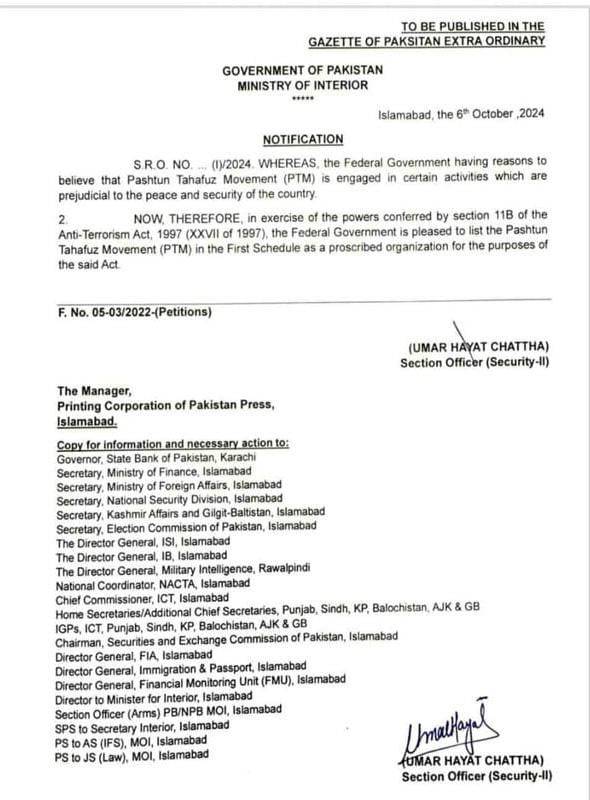
The coalition government, led by the Pakistan Muslim League-Nawaz (PML-N), Monday officially banned the Pashtun Tahafuz Movement (PTM), a rights-based movement advocating for Pashtun human rights, citing national security concerns.
The Ministry of Interior confirmed the decision, which places PTM on the First Schedule of the Anti-Terrorism Act (ATA) of 1997, a list of proscribed organisations. The ministry stated that the government had determined PTM’s activities were "prejudicial to the peace and security of the country."
"The federal government, having reasons to believe that the PTM is engaged in certain activities which are prejudicial to the peace and security of the country, is pleased to list the PTM in the First Schedule as a proscribed organisation for the purposes of the said Act," read the notification issued by the interior ministry.

The ban has been imposed under Section 11-B of the Anti-Terrorism Act, which allows the government to outlaw organisations it believes are involved in terrorism or acting on behalf of proscribed groups.
PTM, founded in 2014 by activist Manzoor Pashteen, emerged as a platform to raise concerns over extrajudicial killings, enforced disappearances, and landmine removal in the erstwhile federally administered tribal areas (FATA). While the group has consistently claimed to operate within constitutional bounds, it has often faced accusations from powerful stakeholders, including the military, of inciting ethnic discord and operating under foreign influence, especially from Afghanistan.
This is not the first time PTM has faced legal challenges. Its leadership, including Manzoor Pashteen and former lawmakers Mohsin Dawar and Ali Wazir, have been charged with various offenses over the years, including hate speech and terrorism.
The ban can be contested by PTM within 30 days under Section 11-C of the ATA, allowing the movement to request a review of the decision. If the government denies the review, PTM can appeal to the high court.
The PTM has had a controversial relationship with authorities, with several leaders, including Ali Wazir, frequently detained. Wazir, who is currently in jail on terrorism charges, has faced numerous legal challenges, including accusations of delivering anti-state speeches.
Critics argue that the government's move to ban PTM could escalate tensions in the already volatile tribal regions, while supporters of the decision claim it is necessary to maintain peace and prevent further unrest.
HRCP condemns decision
Meanwhile, rights group, the Human Rights Commission of Pakistan (HRCP) condemned the government's decision to ban PTM, a rights-based movement that has never resorted to violence and always used the framework of the Constitution to advocate its cause.
"This extreme decision was neither transparent nor warranted," HRCP stated.
The commission called on the government to withdraw the notification and that PTM should be allowed to continue its peaceful advocacy.
"We also oppose former parliamentarian Ali Wazir's continued detention and urge the government to release him unconditionally."

